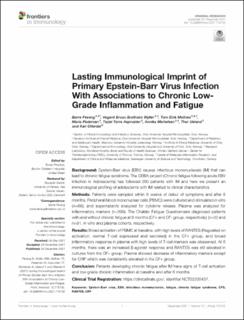Lasting Immunological Imprint of Primary Epstein-Barr Virus Infection With Associations to Chronic Low-Grade Inflammation and Fatigue
Fevang, Børre; Wyller, Vegard Bruun Bratholm; Mollnes, Tom Eirik; Pedersen, Maria; Asprusten, Tarjei Tørre; Michelsen, Annika Elisabet; Ueland, Thor; Otterdal, Kari
Peer reviewed, Journal article
Published version

Åpne
Permanent lenke
https://hdl.handle.net/11250/2839463Utgivelsesdato
2021Metadata
Vis full innførselSamlinger
Sammendrag
Background: Epstein-Barr virus (EBV) causes infectious mononucleosis (IM) that can lead to chronic fatigue syndrome. The CEBA-project (Chronic fatigue following acute EBV infection in Adolescents) has followed 200 patients with IM and here we present an immunological profiling of adolescents with IM related to clinical characteristics.
Methods: Patients were sampled within 6 weeks of debut of symptoms and after 6 months. Peripheral blood mononuclear cells (PBMC) were cultured and stimulated in vitro (n=68), and supernatants analyzed for cytokine release. Plasma was analyzed for inflammatory markers (n=200). The Chalder Fatigue Questionnaire diagnosed patients with and without chronic fatigue at 6 months (CF+ and CF- group, respectively) (n=32 and n=91, in vitro and plasma cohorts, respectively.
Results: Broad activation of PBMC at baseline, with high levels of RANTES (Regulated on activation, normal T-cell expressed and secreted) in the CF+ group, and broad inflammatory response in plasma with high levels of T-cell markers was obeserved. At 6 months, there was an increased β-agonist response and RANTES was still elevated in cultures from the CF+ group. Plasma showed decrease of inflammatory markers except for CRP which was consistently elevated in the CF+ group.
Conclusion: Patients developing chronic fatigue after IM have signs of T-cell activation and low-grade chronic inflammation at baseline and after 6 months.
